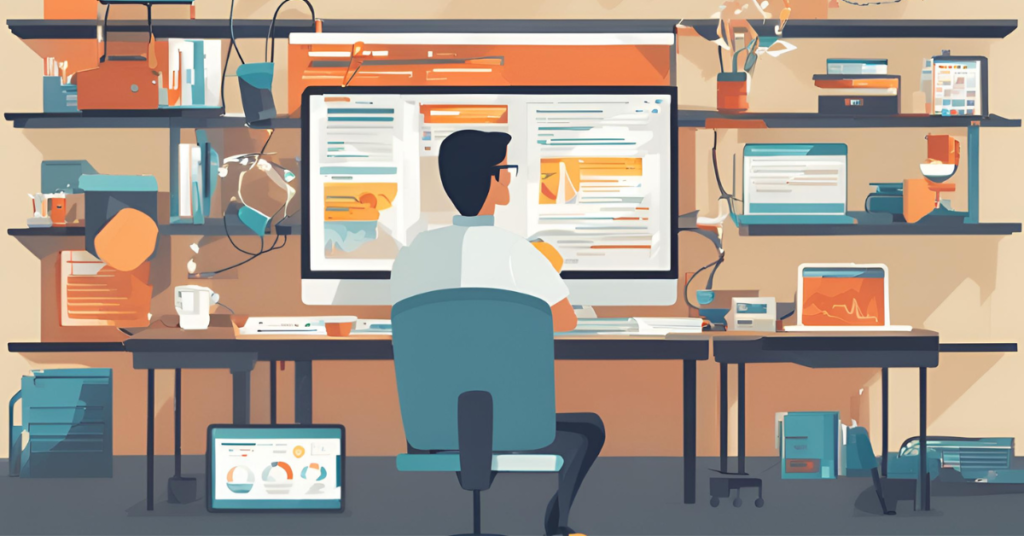
Introduction
Ever wondered what a QA engineer does all day? From meticulously testing software to collaborating with developers, the role of a QA engineer is both critical and fascinating. Quality Assurance (QA) engineers play a crucial role in the software development lifecycle, ensuring that the products delivered are free from bugs and meet the desired quality standards. In this article, we’ll take you through a typical day for a QA engineer, shedding light on their daily tasks, challenges, and contributions to the software development process.

Morning Routine: Starting the Day Right
The day for a QA engineer often begins with a review of emails and messages. This initial check is crucial for catching up on any updates, bug reports, or changes in project scope that occurred overnight. Next, QA engineers review their daily goals and priorities, which are usually outlined in a to-do list or project management tool. This helps in setting a clear direction for the day’s work and ensures that no critical tasks are overlooked.
Daily Standup Meeting
Most teams start their day with a daily standup meeting. This brief meeting typically lasts 15 minutes and serves as a platform for team members to discuss what they worked on the previous day, what they plan to do today, and any obstacles they’re facing. For QA engineers, this is an opportunity to communicate any issues they encountered during testing and to align with the development team on priorities.
Test Planning and Strategy
Before diving into testing, QA engineers need to understand the test plan and strategy. This involves reviewing test plans, creating test cases, and setting up test scenarios. Test planning is essential for ensuring that all aspects of the software are thoroughly tested and that the testing process is efficient and comprehensive.
Test Execution: The Core of QA
Test execution is where the magic happens. QA engineers perform both manual and automated testing to ensure the software functions as expected. Manual testing involves executing test cases manually and checking for issues, while automated testing uses scripts and tools to perform repetitive tasks more efficiently. Tools like Selenium, JIRA, and TestRail are commonly used in this phase to streamline the testing process.
Bug Tracking and Reporting
When a bug is identified, QA engineers document it thoroughly, providing details about the issue, steps to reproduce it, and any relevant screenshots or logs. This documentation is crucial for developers to understand and fix the problem. Communication with development teams is key here, as QA engineers need to ensure that bugs are addressed promptly and effectively.
Collaboration with Developers
QA engineers often work closely with developers to address and resolve issues. This collaboration may involve code reviews, discussing potential solutions, and testing fixes. Effective communication and teamwork are vital for ensuring that bugs are resolved and that the software meets quality standards.
Continuous Learning and Improvement
The field of QA is constantly evolving, and staying updated with the latest trends and technologies is essential. QA engineers often attend workshops, training sessions, and conferences to enhance their skills and knowledge. This continuous learning helps them adapt to new tools and methodologies, improving their effectiveness in ensuring software quality.
End-of-Day Wrap-Up
At the end of the day, QA engineers review their achievements and update their task lists. This wrap-up process helps in assessing what was accomplished and what needs to be carried forward to the next day. Preparing for the next day’s tasks ensures a smooth transition and keeps the workflow organized.
Challenges Faced by QA Engineers
Being a QA engineer comes with its set of challenges. Handling complex test cases, managing tight deadlines, and ensuring comprehensive test coverage can be demanding. However, overcoming these challenges is part of what makes the role rewarding and integral to the success of software projects.
The Impact of QA on User Experience
QA engineers play a significant role in enhancing user experience by ensuring software reliability and usability. Their work helps in delivering a seamless and bug-free product, which directly contributes to customer satisfaction and loyalty.
Career Growth and Development
For those interested in advancing their career, there are numerous opportunities within the QA field. QA engineers can move into roles such as QA Lead, Test Manager, or even transition into other areas like DevOps or software development. Developing skills in automation, leadership, and project management can pave the way for career progression.
A Day in the Life: Anecdotes and Insights
Real-life experiences from QA engineers reveal the diverse nature of their work. From debugging complex issues to celebrating successful product launches, the role is filled with varied and rewarding experiences. Common misconceptions about QA work often include the belief that it’s repetitive or less critical, but in reality, QA engineers are crucial in delivering high-quality software.
Must Try Amazing Free Tools for QA Engineers
TestXpert v1.0
Just select the functionality you are testing and generate testcases magically in one click. Happy testing with TestXpert!
APIWatch v1.0
Tired of manually creating API test cases and logs? Experience the magic of automating your API testing workflow with ease. Simply paste your expected API response, generate comprehensive test cases magically, and effortlessly mark each test as pass or fail. Serve up a freshly baked API Test Report to your stakeholders without missing a single field. Streamline your testing process and ensure thorough API validation effortlessly.
Conclusion
A day in the life of a QA engineer is both dynamic and essential. From the initial morning check-ins to the end-of-day wrap-ups, QA engineers play a pivotal role in ensuring software quality and user satisfaction. Their work involves meticulous planning, testing, and collaboration, all aimed at delivering a product that meets high standards of quality.
FAQs
- What is the most challenging part of being a QA engineer?
- Handling complex test cases and managing tight deadlines can be particularly challenging for QA engineers.
- How does QA contribute to software development?
- QA ensures that software is free from bugs and meets quality standards, directly impacting the user experience and overall product success.
- What skills are needed to become a QA engineer?
- Key skills include attention to detail, problem-solving abilities, familiarity with testing tools, and effective communication.
- How can a QA engineer advance their career?
- Opportunities for advancement include moving into leadership roles, specializing in automation, or transitioning into other technical fields.
- What are some common tools used in QA?
- Common tools include Selenium for automation, JIRA for bug tracking, and TestRail for test management.
Hope you are having a wonderful day! Happy Testing 🙂
![]()
Subscribe to QABash Weekly 💥
Dominate – Stay Ahead of 99% Testers!





